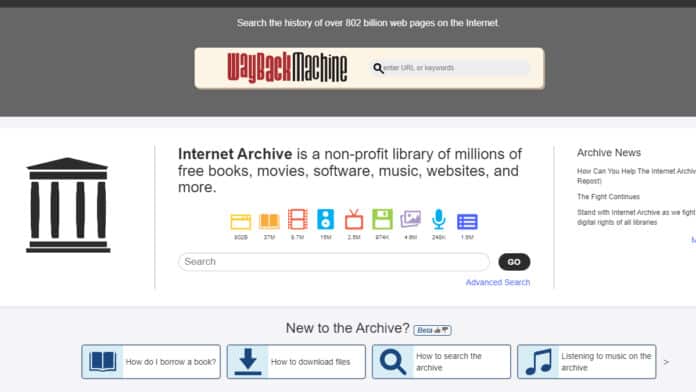The Internet Archive (IA), a non-profit organization, recently announced that a lower court has ruled against the San Francisco-based digital library in a copyright infringement lawsuit filed by four major U.S. publishers.
The four plaintiffs in the case are United States’ biggest publishing houses such as Hachette Book Group, HarperCollins Publishers, John Wiley & Sons, and Penguin Random House.
The United States District Court for the Southern District of New York held that the Internet Archive committed copyright infringement by scanning and distributing copies of books online.
Reacting to the decision, the Internet Archive says that this will impact libraries across the U.S. which depend on controlled digital lending to connect their patrons with books online. It will also hurt authors by saying that “unfair licensing models are the only way their books can be read online”. Lastly, it added that it harms all readers everywhere by holding back access to information in the digital age.
Maria Pallante, the head of the Association of American Publishers, said in a statement that the ruling “underscored the importance of authors, publishers, and creative markets in a global society.”
About The Hachette v. Internet Archive Case
The above case against Internet Archive relates to its Open Library, an e-book repository where users can sign up and lend books for a period of time.
In March 2020, the Internet Archive announced a “National Emergency Library” program and made 1.4 million digital books available for free temporarily from Open Library to help educators and students with digital learning material, as most of the country’s schools and libraries had been shut down due to the COVID-19 outbreak.
Normally, the Internet Archive online library can be accessed under certain “wait time” restrictions that allow one borrower at a time to gain access to a scanned book for 14 days.
However, these restrictions were suspended in March in response to the global pandemic and books were made available immediately to anyone with an account till the end of June or until the national lockdown in the U.S. ends, whichever is later.
This did not go well with major four major U.S. book publishers – Hachette Book Group, HarperCollins Publishers, John Wiley & Sons, and Penguin Random House, who filed a lawsuit against the Internet Archive for the National Emergency Library in June 2020. Soon after, the archive shut down the library.
In the complaint, the publishers asked for an injunction that ordered “all unlawful copies be destroyed” in the online archive.
The plaintiffs also argued that the practice of controlled digital lending (CDL) was illegal and not protected by the doctrine of Fair Use. It claimed that CDL has cost their companies millions of dollars and is a threat to their businesses.
For those unaware, the Internet Archive uses a CDL system, a practice that depends upon digital rights management (DRM) to prevent unauthorized downloading or copying of books that are still in copyright. Following the lawsuit, both parties filed motions for summary judgment.
Judge John G. Koeltl of the U.S. District Court in Manhattan decided in the publishers’ favor that the National Emergency Library did infringe the publishers’ copyrights and that it was not protected as a form of fair use.
The judge also ruled that the Internet Archive produced “derivative” works that required permission from the copyright holder.
“Although IA has the right to lend print books it lawfully acquired, it does not have the right to scan those books and lend the digital copies en masse,” he wrote.
The Internet Archive intends to appeal the lower court’s decision, as it said that its actions were protected by fair use laws.
“We will keep fighting for the traditional right of libraries to own, lend, and preserve books. We will be appealing the judgment and encourage everyone to come together as a community to support libraries against this attack by corporate publishers,” IA’s Director of Open Libraries, Chris Freeland, said in a statement.
“We will continue our work as a library. This case does not challenge many of the services we provide with digitized books including interlibrary loan, citation linking, access for the print-disabled, text and data mining, purchasing ebooks, and ongoing donation and preservation of books.”
Brewster Kahle, the founder of Internet Archive, too said in a statement, “Libraries are more than the customer service departments for corporate database products. For democracy to thrive at global scale, libraries must be able to sustain their historic role in society – owning, preserving, and lending books. This ruling is a blow for libraries, readers, and authors and we plan to appeal it.”

